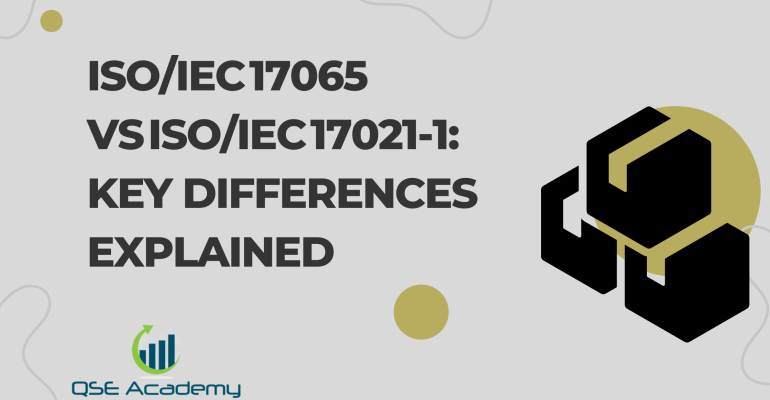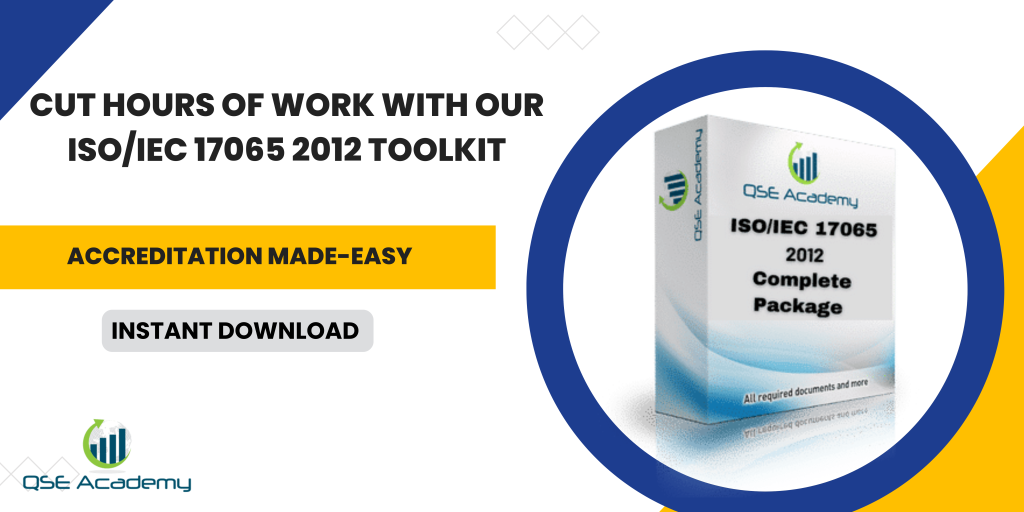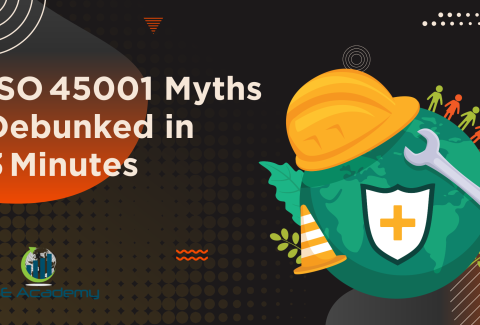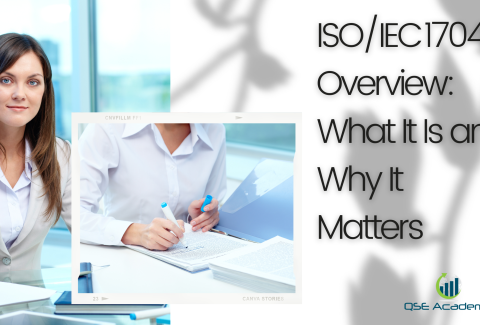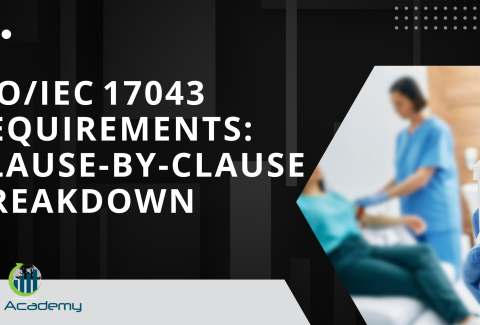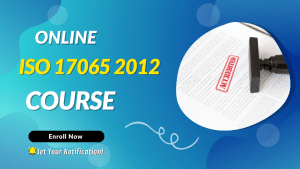ISO/IEC 17065 vs ISO/IEC 17021‑1: Key Differences Explained
Last Updated on December 23, 2025 by Hafsa J.
Understanding the Difference Between Product and Management System Accreditation
When people hear “ISO certification,” they often assume there’s only one type. That confusion has led to plenty of wasted time and wrong applications.
In my experience working with both product-certification and management-system certification bodies, I’ve seen this misunderstanding too many times.
Here’s the truth: ISO/IEC 17065 and ISO/IEC 17021-1 are both international standards for certification bodies—but they serve different purposes.
This article will help you:
- Understand which one applies to your organization.
- Recognize how their scopes and structures differ.
- Avoid common mistakes when building or applying for accreditation.
Scope & Purpose of Each Standard: ISO/IEC 17065 for Products vs ISO/IEC 17021-1 for Management Systems
Let’s start with intent.
ISO/IEC 17065 governs how certification bodies assess products, services, or processes. It’s about proving that something meets defined requirements—think organic food labels, eco-certified packaging, or GMP cosmetics.
ISO/IEC 17021-1, on the other hand, focuses on management systems like ISO 9001, ISO 14001, or ISO 45001. It ensures that organizations are consistently managing quality, environment, or safety—not individual products.
Here’s what I’ve noticed: certification bodies often use “ISO certification” loosely, but the difference between these two is huge.
If you certify a system, you follow 17021-1.
If you certify a product or service, you follow 17065.
Pro Tip: When clients ask, “Can we get ISO certification for our product?”—clarify which type they mean before quoting a scope or scheme.
Common mistake: A few bodies I’ve advised used 17021-1 audit procedures for product evaluations. Accreditation bodies reject that immediately because 17065 requires product-specific technical evaluation.
Example:
A food certification body used 17065 for verifying organic compliance—testing samples, verifying labels, and maintaining scheme rules.
Meanwhile, a separate team used 17021-1 for auditing food companies’ ISO 22000 systems. Two different scopes, two different rules.
 Structural Differences and Clause Alignment
Structural Differences and Clause Alignment
Both standards follow ISO’s CASCO structure—impartiality, competence, confidentiality, complaints handling—but their focus areas differ.
17065 includes product evaluation and certification-scheme design.
17021-1 dives deep into auditing processes and auditor competence.
Here’s a simple way to see it:
- 17065 = “Does the product comply?”
- 17021-1 = “Is the management system working effectively?”
Pro Tip: If you’re managing both standards, keep a side-by-side clause matrix. It helps you align shared requirements like impartiality or documentation but prevents you from mixing up scheme-specific clauses.
Common mistake: Thinking similar clause numbers mean identical requirements. For instance, both mention “competence,” but 17065 demands technical experts for product evaluation, while 17021-1 expects qualified auditors for management systems.
Example:
During one accreditation, a client presented one Quality Manual for both standards. The assessor asked, “Where’s your scheme control procedure?” They didn’t have one—it was a 17021-1 document. They had to rewrite half their system to comply.
Operational Process: From Application to Certification Decision
Now that we’ve covered structure, let’s talk process.
Under ISO/IEC 17065, the workflow looks like this:
- Application and review.
- Product testing or evaluation.
- Technical review and decision.
- Surveillance or re-testing.
Under ISO/IEC 17021-1, it’s different:
- Stage 1 audit (documentation readiness).
- Stage 2 audit (implementation review).
- Certification decision.
- Annual surveillance and 3-year recertification.
The distinction matters because the evaluation method changes everything—testing and inspection vs auditing.
Pro Tip: Always document how you separate evaluation from decision. Both standards emphasize impartiality but define it differently.
Example:
In a product scheme, you might have a technical committee reviewing test data before granting certification.
In a management system scheme, your lead auditor submits a recommendation, and a certification decision-maker finalizes it.
That’s why mixing the two models leads to chaos—your evaluation depth, sampling, and decision timing will never match the right standard.
Competence and Impartiality Requirements
Competence is where most certification bodies struggle.
Under 17065, competence depends on product type—chemical, mechanical, food, cosmetic, etc. Assessors must have technical depth.
Under 17021-1, it’s about auditor skill—understanding standards, auditing principles, and industry context.
Pro Tip: Build a competence matrix for each scheme or standard you certify. Accreditation bodies love seeing proof that you match staff skills with scope.
Common mistake: Using auditors for technical review without verifying they understand the product’s specifications. That’s a fast track to a non-conformity.
Example:
A certification body I trained once used ISO 9001 auditors to decide on electrical safety certificates. They failed the ISO 17065 audit because those auditors had no product-testing background. After creating a product-specific competence matrix, their next assessment passed smoothly.
Documentation and Accreditation Body Expectations
Accreditation bodies want one thing above all—clarity in your system.
For 17065, that means:
- Documented certification schemes.
- Product evaluation and surveillance procedures.
- Defined decision rules and labeling controls.
For 17021-1, it means:
- Audit programs and checklists.
- Audit-team competence criteria.
- Certification-decision procedures.
Pro Tip: Even if your management system covers both, separate your records and procedures by standard. It makes accreditation assessments far easier.
Example:
An assessor once told my client, “You’ve met 17021-1, but your product scheme doesn’t exist.” They thought their audit program counted. It didn’t. They needed a scheme document outlining sample testing, acceptance criteria, and surveillance intervals.
Choosing the Right Standard for Your Organization
So how do you decide?
Here’s the simple rule:
- If you certify products, processes, or services, go for ISO/IEC 17065.
- If you certify management systems, go for ISO/IEC 17021-1.
Some certification bodies do both—but with dual accreditation and clearly separate scopes.
Pro Tip: Never use one Quality Manual for both unless you clearly identify which clauses apply to which standard. Accreditation bodies expect traceability.
Example:
A client offered both ISO 9001 audits and product certification for safety helmets. They set up two systems under one umbrella—shared impartiality committee, separate evaluation processes. Dual accreditation achieved, zero non-conformities.
This choice defines your credibility and growth path, so get it right early.
FAQs
Q1: Can one certification body be accredited to both ISO/IEC 17065 and ISO/IEC 17021-1?
Yes, absolutely. Many are. The key is maintaining separate scopes, competence frameworks, and documented processes for each.
Q2: Is ISO/IEC 17021-1 a prerequisite for ISO/IEC 17065?
No. They’re independent standards under ISO CASCO. You can be accredited to either—or both—depending on your services.
Q3: Who grants these accreditations?
Accreditation bodies under ILAC or IAF multilateral agreements, like UKAS, ANAB, or DAkkS, typically handle both.
Conclusion: Choosing the Right Path to Credible Certification
Both standards build trust—but in different ways.
ISO/IEC 17065 validates the quality of a product or service.
ISO/IEC 17021-1 validates the effectiveness of a management system.
When you understand that difference, you save months of work and avoid costly missteps during accreditation.
I’ve guided several organizations through both paths, and the lesson is always the same: clarity brings confidence.
If you’re unsure which path fits your certification body, download QSE Academy’s ISO 17065 vs 17021-1 Comparison Checklist or book a short consultation to map your next step.
I hold a Master’s degree in Quality Management, and I’ve built my career specializing in the ISO/IEC 17000 series standards, including ISO/IEC 17025, ISO 15189, ISO/IEC 17020, and ISO/IEC 17065. My background includes hands-on experience in accreditation preparation, documentation development, and internal auditing for laboratories and certification bodies. I’ve worked closely with teams in testing, calibration, inspection, and medical laboratories, helping them achieve and maintain compliance with international accreditation requirements. I’ve also received professional training in internal audits for ISO/IEC 17025 and ISO 15189, with practical involvement in managing nonconformities, improving quality systems, and aligning operations with standard requirements. At QSE Academy, I contribute technical content that turns complex accreditation standards into practical, step-by-step guidance for labs and assessors around the world. I’m passionate about supporting quality-driven organizations and making the path to accreditation clear, structured, and achievable.

